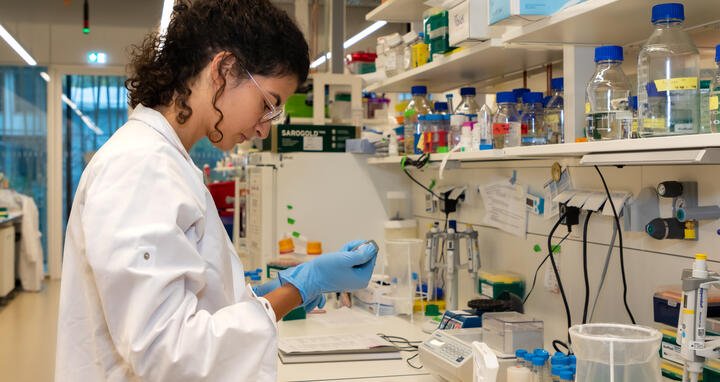Methodological tour-de-force: Biochemist Annita Louloupi receives Marthe Vogt Award
During her doctoral work at the Max Planck Institute for Molecular Genetics (MPIMG) and Freie Universität Berlin, Annita Louloupi within a team of scientists developed a new methodology to detect and analyze N6-methyladenosine (m6A) modifications on precursor RNA molecules. Using this methodology, she could show that m6A accelerates RNA splicing. Since 2001, FVB has presented the Marthe Vogt Award to women junior researchers active in a field covered by one of the FVB’s institutes. The doctoral dissertation must be completed at a research facility in Berlin or Brandenburg. The award is worth 3,000 euro.
Dr. Annita Louloupi. Image: Felix Petermann, MDC
DNA (deoxyribonucleic acid) carries the genetic instructions for the development and growth of all known organisms. In order for these “instructions” (genes) to be converted into a functional product, the DNA is first copied – or transcribed – into RNA (ribonucleic acid). Similar to DNA, RNA consists of four different nucleotides whose sequence encodes the genes. The sequence that codes the functional product (exons) is interrupted by non-coding regions (introns); these introns are also transcribed. Next, during a process called RNA splicing, the introns are carefully removed, leaving only the exons to be later translated into the functional product – proteins. This process is an important and highly regulated step during gene expression.
RNA nucleotides can be biochemically modified during their life cycle. Although such modifications do not alter the genetic information carried by RNA, they can affect its functionality. In her doctoral research, Annita Louloupi studied one of the most widespread RNA modifications, m6A, a methylation that occurs at the N6-position of adenosine. Her main goal was to understand how m6A regulates RNA splicing and, more specifically, the rate of splicing.
The challenge facing Annita Louloupi at the beginning of her doctoral work was to develop new analytical techniques that would be accurate and sensitive enough to detect m6A-modified RNA during its brief “nascent” state, i.e. during the short phase immediately after transcription yet before RNA undergoes RNA splicing. “My questions have driven my methods,” stated the biochemist, describing her approach. By combining several of these techniques, Annita Louloupi was able to gain new insights on the role of m6A modification in RNA splicing kinetics. When put onto a specific region within the “nascent” RNA, the m6A acts as a “fast-track ticket” in the processing queue – RNA with such a ticket will develop into “mature” functional RNA faster than that without a ticket.
RNA modifications have been linked to several diseases, including cancer, cardiovascular diseases, genetic birth defects, metabolic diseases, neurological disorders, and viral infections. The methodology that Annita Louloupi developed provides a valuable toolkit for other molecular biologists, as it can be adapted or directly applied in different cancer cell lines, cells going through differentiation, virus infections, and/or treatments.
In January 2019, while still completing her dissertation, Annita Louloupi started her postdoctoral research in the Computational Regulatory Genomics Laboratory at the Berlin Institute for Medical Systems Biology (BIMSB of the Max Delbrück Center for Molecular Medicine in the Helmholtz Association (MDC). “We congratulate Annitta Louloupi and are very happy with her. The Marthe Vogt Award is an honor for young women scientists and a great incentive to follow their path in science," says Thomas Sommer, Scientific Director of the MDC (interim).
Currently, she is involved in multiple different projects that revolve around post-transcriptional gene regulation. “It’s been a hectic and stressful year, and I am very grateful for this award because it has given me an opportunity to pause and reflect back on my doctoral work and appreciate the things I have accomplished.”
Invitation to the Marthe Vogt Award ceremony
The award ceremony will take place digitally during the Berlin Science Week on November 3, 6-7 pm. Use the following link to attend our event: https://fv-berlin-virtuell.de/. Registration is not required. The event will be held in German and English.
Please find further information at https://www.fv-berlin.de/en/info-for/the-media-and-public/news/invitation-to-the-marthe-vogt-award-ceremony.
Marthe Vogt Podcast
Listen the interview with Annita Louloupi for the Marthe Vogt Podcast to know more about her scientific journey.
Contact
Jutta Kramm
Head of Communications
Max Delbrück Center for Molecular Medicine in the Helmholtz Association (MDC)
+49-30-9406-2140
jutta.kramm@mdc-berlin.de oder presse@mdc-berlin.de
Forschungsverbund Berlin e.V.
Press and Public Relations
Dr. Natalia Stolyarchuk
Phone +49 30 6392-3449
Email stolyarchuk@fv-berlin.de






